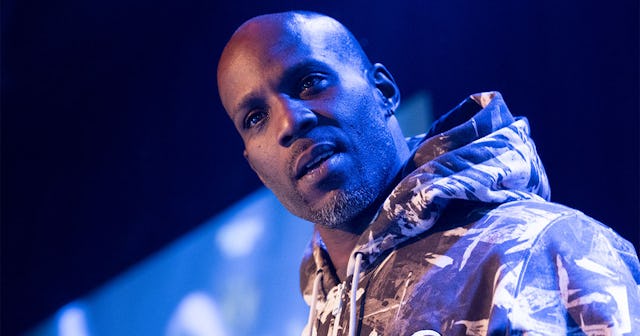DMX Has Died At Age 50

The husky-voiced rap icon allegedly suffered a drug overdose and ensuing heart attack earlier this month
Rapper DMX has died, a family rep confirms. “We are deeply saddened to announce today that our loved one, DMX, birth name of Earl Simmons, passed away at 50-years-old at White Plains Hospital with his family by his side after being placed on life support for the past few days,” an announcement from his family says.
“Earl was a warrior who fought till the very end. He loved his family with all of his heart and we cherish the times we spent with him. Earl’s music inspired countless fans across the world and his iconic legacy will live on forever.”
“We appreciate all of the love and support during this incredibly difficult time,” the statement continues. “Please respect our privacy as we grieve the loss of our brother, father, uncle and the man the world knew as DMX. We will share information about his memorial service once details are finalized.”
Researchers who study addiction claim that once an individual’s body becomes dependent on a drug, the neurons in his or her brain change – which is a clinical (and accurate) way to say that addiction changes a person. Priorities shift, relationships waver, and the body becomes focused on one thing and one thing only: the next fix.
Of course, this is an oversimplification of a crushing reality for the loved ones of those living with addiction: they no longer recognize the person they love.
For the person living with addiction, the chemicals in their body lie to them, telling them nothing is as important as feeding their addiction. Among the cruelest aspects of addiction are moments of clarity – when the drugs relax their grip for just a moment, and the brain clears. That’s when shame can creep in, crushing an already fragile mental state. Demi Lovato has spoken openly about her struggles with addiction, giving light to an issue that many people choose to keep silent.
His passing has many people talking about the heartbreak of addiction.
DMX was open about his battles with addiction too, in addition to the time he spent incarcerated, Pitchfork reports. In 2018, he was sentenced to a year in prison for tax evasion. After an epic VERZUZ appearance with Snoop Dogg, DMX spoke with rapper Talib Kweli in a late 2020 interview on the latter’s podcast, People’s Party With Talib Kweli. He alleged that Ready Ron sparked a crack addiction after passing him a blunt laced with the drug when he was a teen. “Why would you do this to a child,” DMX wondered. “He knew I looked up to him. Why would you do that to someone who looked up to you?”
Born Earl Simmons in Baltimore, Maryland, DMX spent much of his early life in Yonkers, New York. He endured a troubled boyhood, growing up in an abusive home and spending time in boys’ homes and, eventually, juvenile facilities. It was during his time at one of those boys’ homes that he began writing music, ultimately connecting with producer Ready Ron.
DMX’s signature husky growl —partly caused by asthma— made his songs instantly identifiable. His 1999 album …And Then There Was X went multi-platinum off the success of the singles Party Up and What’s My Name. In addition to music, DMX also became a film star, appearing in Romeo Must Die, Exit Wounds, Cradle 2 the Grave, and more.
In the same interview with Kweli, DMX described his struggle with addiction. “Drugs were a symptom of a bigger problem,” he said. “There were things that I went through in my childhood where I just blocked it out—but there’s only so much you can block out before you run out of space. I really didn’t have anybody to talk to about it. So often talking about your problems is viewed as a sign of weakness. When it’s actually one of the bravest things you can do.”
If you or someone you know is living with addiction, there are places you can call for help. The Substance Abuse and Mental Health Administration (SAMHSA) offers a National Helpline – 1-800-662-HELP (4357). SAMHSA’s National Helpline is a free, confidential, 24/7, 365-day-a-year treatment referral and information service (in English and Spanish) for individuals and families facing mental and/or substance use disorders.
This article was originally published on